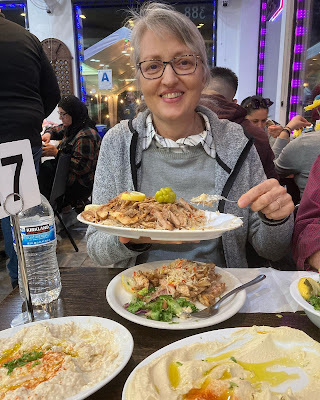“Marketing Tools for Published and Pre-Published Authors.” That seemed like something I badly needed, with my new self-published book arriving any day, so I signed up for the class at a writing conference two months ago.
Perhaps twenty-five people, most of them my age or older, sat at round tables in a windowless classroom. The others at my table were a man named Tom who was about my age and a white-haired woman about twenty years older that we will call Jane.
The cheerful young teacher—I’ll call her Mandy-- handed us papers to fill out as the class began.
We looked at the first question, then at each other. “Where am I now with number of subscribers?”
The second was like unto it: “Where would I like to be with number of subscribers?”
I raised my hand. “Is this email subscribers or Facebook followers or what?”
“All of the above,” Mandy said. “Social media, email, everything.”
“That’ll be easy,” muttered Tom. He jotted briefly, then said, “I wrote ‘Less than 1000’ because it sounded better than ‘Less than 100.’”
Jane frowned in confusion over her paper.
I tried to remember how many followers I had on Facebook and my blog, and how many people used to get my newspaper column by email. I guessed at the number of subscribers and added it to my list.
I seldom track my followers on various platforms, but even with my best guesses, and even comparing with Mr. Less Than 1000, my numbers seemed weak and pathetic when Mandy explained that publishers today won’t even look at your work unless you have at least 40,000 followers.
Mandy then launched into a rapid and confident lecture about followers, lead magnets, and promo tools, about Wix, genre, audience, MailChimp, and branding.
I glanced around and felt heartened to see that everyone looked as glum and confused as I felt. Writing conferences are rich sources of information and connection, but even at the best of times they can make your biggest fears bubble to the surface and your most persistent worries walk onstage in your brain. The question is always, “Do I have what it takes?” For my generation, the question has an added layer: “Do I have what it takes in today’s world?”
I felt like I understood about 30% of what Mandy said, but, essentially, what I took from the class was that subscribers and followers are crucial if you want to be a published writer, and email-newsletter subscribers are the blue ribbon/gold medal of the industry. Of course, to get email subscribers you have to snag that elusive prize: email addresses.
Hmmm, I thought. Apparently I need to find ways to ask people if they want to be on my email list.
But no. You can’t be that honest and obvious.
Mandy’s advice for obtaining all those addresses was this: you come up with a freebie of some sort—maybe a printable list of motivational quotes, or a short story connected to your books. You set this up with a website that’s designed for this sort of thing, and then link it to all your social media platforms.
“Click here for a free short story!!” “Free printable poster for moms!”
Then, when people click to get the freebie, a popup window tells them to enter their email address before they go on to the prize. And ta-da! You’ve got another email address to exploit, although Mandy didn’t use that word.
You’ve seen these boxes a thousand times, I’m sure, and happily typed your address. Well. Just so you know, someone was very happy to snag your address.
So, said Mandy, you then have their email address in hand, and pretty soon you’ll have enough accumulated for Zondervan and Revell to take your manuscript seriously. How happy is that!?
We were skeptical. Isn’t that kind of dishonest? Shouldn’t you ask people straight up if they want to sign up for updates from you?
Oh no, it’s not sketchy at all! You are actually giving them something they want, not a brand or a sales pitch so much as a piece of YOU, of emotion, of connection, of inviting them along on your journey! Share what God’s given you, rather than “marketing!”
Across the table, Tom muttered, “This process makes me feel like I’m selling timeshares.”
Despite our questions and confusion, Mandy’s happy, confident demeanor never faltered as she lectured on and on, the unfamiliar terms flying at us like baseballs that clonked into our heads and left us dazed. Premade templates! Podcasts! Tools for launching! Opt-in forms!
“I can never do this,” said Jane when the class ended. “I guess I can’t ever be published.”
We filed out, twenty-five people with a fragile dream, feeling like maybe the world had moved on and we were left behind with no more chances of success.
As I wandered toward the coffee server in the foyer, I couldn’t stop thinking about the two Amish ladies I’d met the week before.
After I had spoken at a ladies’ retreat in another state, Paul and I attended a fish-fry fundraiser in an Amish community. Two of the women recognized me and came over to talk. They were also authors, young sisters-in-law who had collaborated on a fiction-based-on-fact book that was doing well in the Anabaptist world. One of them mentioned that they’d just ordered their third printing.
Authors are nosy, so I had to ask, “How many books are in each printing?”
“Five thousand,” she said, quite matter-of-factly, as though sharing that they get two dozen eggs every day from their hens.
My stars.
I was very impressed and told them so.
I Googled this just to make sure my impression was right. It was.
How many fiction books sold is considered successful?
Qualifications aside, if you are a new writer at a big publisher and you've sold more than 10,000 copies of a novel you are in very good shape — as long as you didn't have a large advance. It should be easy for you to get another book contract. If you sold more than 5,000, you are doing pretty well.
--Scribemedia
So, as I left the class on marketing, I tried to correlate these conflicting situations. First, the Christian publishing world with its emphasis on glitz, gimmicks, social media, and a vast following. And then, these two sweet Amish women on their way to selling 15,000 books with no online presence, no premade templates for emails, and no pre-launch magnets. They fly completely under the radar of both the Christian and secular publishing industries, and quietly outsell a good percentage of the books published with great fanfare in the broader world.
I saw Mandy near the table where my books were set out for sale, so I told her about the Amish writers I’d met and how I felt there had to be some way for us older, traditional writers to be successful without all the online marketing methods. She looked as confused as Tom and Jane [and I, I’m sure] did during her class, and I’m sure I didn’t explain myself well, because the jarringly-different images were still clanking together and breaking in my brain, and I was trying to process my thoughts by talking to her.
How did I expect a young online marketing expert to understand the unique connectivity of the Amish community, a world that flourishes out of sight, much like the mushrooms of the Oregon forest that are connected underground over vast areas, forming the biggest living organisms in the world?
[More info here] [email address not required]
I didn’t tell her this, but recalling the Amish authors gave me a sense of hope after that disheartening class. Maybe Mandy and others like her won’t have the last word about publishing.
I wonder if future historians will look back at the writers of my generation and wonder what it was like to navigate the enormous, sweeping changes in communication. I would like to think they’ll give us credit for adapting, for developing skills and watching them become obsolete, and for forcing ourselves, at retirement age, to become inept kindergarteners, slowly learning to post Instagram photos and Facebook Lives.
It happened in transportation and medicine in previous generations. My dad, I’m told, was the best horseman in the county when he was a young man in Oklahoma. By the time he was in his sixties, he farmed with tractors. All that hard-won knowledge and expertise with horses was obsolete, and he was stuck in a more modern world, always wrestling with mysterious, cantankerous, uncooperative machines, always seeming incompetent.
James Herriot, in his books about working as a veterinarian in Yorkshire, tells of the dispensary full of bottled chemicals and medicines, and all the hard work to learn the exact dosage for each disease in each sort of animal. Then all that knowledge was useless, swept away by the new antibiotics that came after World War II.
When I first pursued writing, the process was strict and straightforward. Magazines, newspapers, books. Typewritten query letters, synopses, and sample chapters. First, second, or full rights for periodicals. We learned at conferences to write informative queries, to include the title on each page of the manuscript, and to keep a rotation of articles in the mail, circulating from one potential publisher to the next to the next. We knew that double spacing and proper margins were important to editors. Often, there was only one copy of our manuscript, and if it got lost in the mail, it was gone forever.
Then, it all changed.
First came computers, writing programs, and the end of KoRecType. Blogs, Instagram, Facebook, TikTok followed, with content creation that included not only writing but photos, videos, links, gimmicks, and giveaways. Paper publications disappeared. Online marketing became essential. It was a wild and rapidly changing world with a completely new set of skills.
We seasoned Mennonite writers, having worked our way slowly up the publishing ladder, closed our filing cabinets full of manuscripts, rejection letters, and sample magazines and watched slack-jawed as young Mennonite moms launched YouTube channels, racking up more followers in one year than we had scratched together in 30 years of submissions, rejections, and early-morning typing.
“But Mom, you’re not competing. They post cute videos of their babies and living room décor. You write real writing. It’s completely different.” That’s what my lovely daughters told me when I tried to explain how disconcerting it all feels. They are my guides to the internet world, interpreting and coaching, and their words helped. “Besides, you reach a completely different audience. It’s not like they’re stealing anyone from you.”
I said I know that, but still. Sometimes the influencers write books, and then it feels like competition, even though there’s room in the world for both of us.
Jenny said, "You're not an influencer. Yeah, they'll sell books, but no one reads them."
"Come on. No one?"
"Well, ok, but they end up at Goodwill. They don't keep them and re-read them."
Our son Ben said, “Just remember that followers don’t necessarily translate to sales.”
All right then. My kids obviously think I should follow my calling and let the influencer moms follow theirs. Sometimes they’re wiser than me.
Recently, a discouraged author friend called me. While she’s younger than me and far beyond me in email formatting and online marketing, she still feels dismayed at the young women posting on Instagram or channeling the vibe into successful online businesses. “I really can’t help but compare myself with a young lady in our community. She randomly started a small business printing cards and that kind of thing, and she just “gets” the Instagram look, if you know what I mean. She’s just gone gangbusters. And I think about how long and hard I’ve worked, and I still have way less of an audience.”
“You’re not competing,” I said, parroting my daughters. “You write actual books.”
My friend brought me up short with a brutal fact. “She can afford to add onto her house and fix it up pretty. Not to be ungrateful for what I have, but let's be honest, that's the most glaring difference between her work and mine."
I could only sympathize. Maybe we’re not competing in the same race, technically, but we are conservative Mennonite women presenting creative content to the world. It was hard enough in our day to gain an Anabaptist audience. It was ten times as hard to find publishers and readers in the broader non-Mennonite culture.
And then Sharla from down the road hops on Instagram, as they say, and a year later has thousands of non-Menno followers hungry for a taste of the simple lifestyle. Furthermore, she makes money at it.
It’s incredible to watch it happen. I am happy for them in the same way that my grandma was probably thrilled that her children had running water and modern washers.
At the same time, I wonder about the effects of success coming so easily. Did farming with horses or typing on a typewriter build a sort of character unavailable today?
I also circle back to all the characters in this story, such as those Amish authors, writing and selling books in a universe outside of social media and mainstream Christian publishing. I think of Mandy, telling us confidently how marketing needs to be done, and the grandma at my table, feeling like there’s no room for her and her story.
I have always said that each of us has a story to tell, and we need to find a way to tell it. So I really should applaud those who do, whether it’s self-published Amish women or Sharla Stoltzfoos in her white veil, baking bread for an audience of 50,000.
I wish the big Christian publishers would choose authors more for quality content than for the potential audience they bring. I wish Marketing Mandy could recognize that her rapid-fire teaching excludes my generation, and especially the writers who are twenty years older, making us feel like today’s publishing world has no place for us.
I think we who tell stories of any kind need to draw others in rather than building fences that keep them out. What would it be like if Mandy sat down with the Amish authors and they learned from each other? Or if a young influencer interviewed Jane and shared her story on YouTube?
Maybe the Mennonite ladies on Instagram, reading to their babies in their pristine white living rooms, could teach me a thing or two about growing an audience and being a Mennonite woman telling her story to a secular world.
Most of all, I need to tell my own story and follow my own calling. These days, that means typing on a laptop surrounded by handwritten notes on random papers, producing books outside of traditional publishing, and doing all I can to mentor beginning writers and encourage the experienced writers who feel bogged down in the waves of change swirling all around.
I don’t know how history will judge my generation of authors, but I hope it will be said of us that we adapted with the times, we drew others in, and we were brave. Most of all, I hope we will be found faithful to our calling of telling our stories, whether that involved typewriters or TikTok.
And here's my brave attempt at online marketing: You can order my books HERE.
















